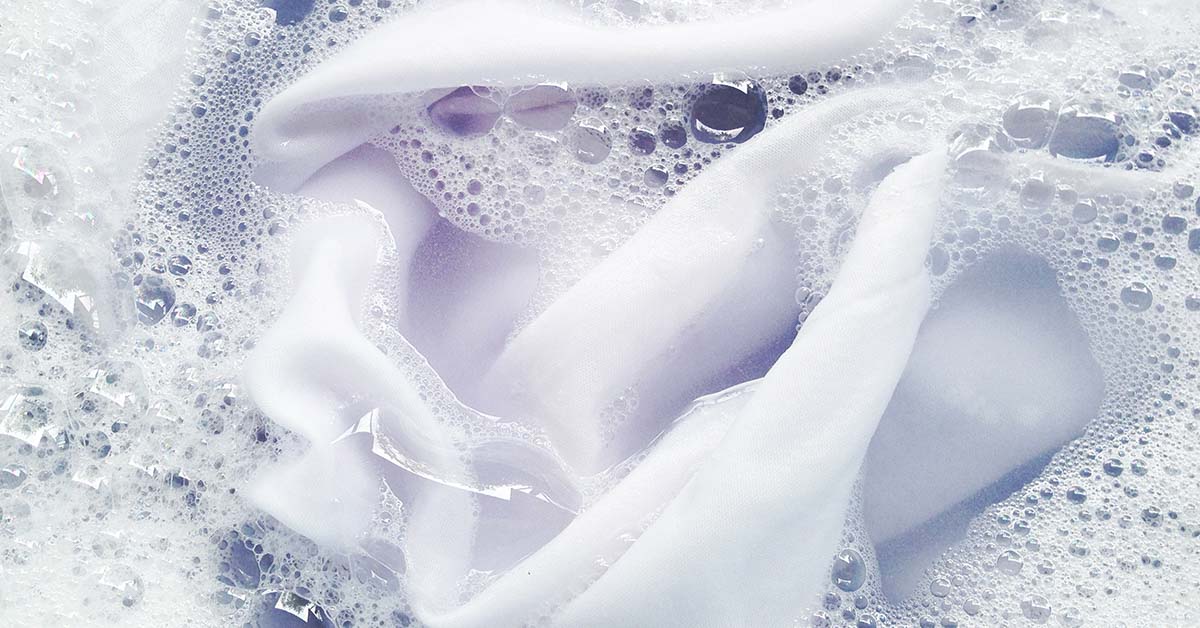You have likely used vinegar in your kitchen to dress a salad, or maybe to make a quick pickle. If you’re a little more environmentally conscious, you might have used it to clean your counters as well.
But have you ever considered using it in your laundry? Vinegar provides an inexpensive alternative that is healthier for you, your family, and the environment.
Distilled white vinegar has many uses, and when used in your regular laundry routine it can remove stains, soften hardened towels, and get rid of odors.
How Does Vinegar Work as a Cleaning Agent?
Vinegar is very acidic, which is why it’s such an effective cleaning agent. With a pH of 2.5, the white distilled stuff is best suited for household cleaning, and this acidity can dissolve away soap scum, hard water stains, and even glue left behind by stickers [1,2].
It is important to note that the pH will vary depending on the type being used. For instance, cleaning vinegar, which has concentrations up to 10% acetic acid has a pH of approximately 2.0 [3]. For laundry purposes, it is best to stick with a regular 5% solution.
6 Uses for White Vinegar in your Laundry
When you use it properly, white vinegar can tackle many of your laundry-related woes. The following are ways that this acidic liquid can improve the quality of your wash on laundry day:
1. Get Rid of Odors
Does your laundry have mildew, do you struggle with sweaty armpit smells, or do your clothes just generally have an unpleasant funk? Vinegar can destroy the bacteria that cause these odors.
For mildewy towels, add 2 cups of distilled it to a washer filled with hot water, add your towels, and run the normal cycle.
To deodorize your clothes, add half to one cup of vinegar to the rinse cycle.
For smells that are particularly strong and difficult to get rid of, presoak those items in one cup of vinegar mixed with cold water, and let them sit for twenty minutes before washing [4,5].
2. Remove Stains
To remove stains, spray the affected area with vinegar and allow it to sit for ten to fifteen minutes before washing. If it is a mild stain, you can soak the item instead in a mixture of one cup of vinegar with two cups of warm water.
You can remove harsh stains by using a paste made from one tablespoon of baking soda and vinegar, but do this sparingly [4,5].
3. Protect Colors
Soapy residue can often stick to the fibers of your clothing. This can make dark items become lighter after several washes. To prevent this, put half to one cup into the final rinse cycle, and keep your dark colors dark [4,5].
4. Fight Static
Do your clothes come out of the laundry with a lot of static, lint, or pet hair? Adding a half cup of vinegar into your washer’s rinse cycle can solve your problem [4,5].
5. Use as a Fabric Softener
Because it breaks down detergent residue, it can be used to soften your clothes, linens, and towels. Instead of a commercial fabric softener, add a half cup of vinegar to the fabric softener dispenser in your machine and let it do its magic [4,5].
6. Reverse Dye-Damage, Preserve Whites
Sometimes the color in your clothes can run or “bleed”. If this happens to you, add one cup of vinegar to your wash cycle along with your regular detergent to reverse the problem.
If your whites are starting to discolor, try adding one and a half cups of it to the wash cycle. For stubborn underarm stains, soak white items in a half-gallon of hot water mixed with two cups of vinegar overnight before washing [4,5].
Vinegar Precautions
It is important that you use vinegar properly so that you don’t ruin your clothes or your laundry machine. Keep the following guidelines in mind next time you do your laundry:
- You can use it together with detergent, but don’t mix them. Add it to the rinse cycle after the detergent is out, or else you could end up with oily clothes [6].
- Where and when you add the it in the wash cycle depends on what you’re trying to achieve. If you want to soften your clothes, add it to the softening dispenser. To get rid of odors, add it directly to the washing basin during the rinse cycle, or use it instead of regular detergent, and add it again during the rinse cycle for strong odors. To brighten your clothes, add it to the bleach dispenser [6].
- Be careful when using it on more delicate fabrics. If it is too concentrated, it can actually stain them [2].
- Always check with the manufacturer of your washing machine to ensure that it is made with materials that will withstand vinegar, as the strong acid can eat away at certain materials, and some users have reported issues with scum buildup in parts of their machines once they started using it [7].
- Use baking soda sparingly, as it can clog pipes and hoses and could destroy your machine [7].
The Bottom Line
When you use vinegar properly, it can be an excellent addition to your regular laundry routine. It can improve the look, feel, and smell of your clothes and linens, without all the added chemicals.
If you’re looking to green up your laundry routine, head to the grocery aisle and grab a bottle of the acid liquid. It’s an inexpensive way to improve your laundry and lower your environmental footprint.
Keep Reading: Doctor Explains How To Keep Glasses From Fogging Up While Wearing A Face Mask
This article originally appeared on Tiffy Taffy and has been republished here with permission.
Sources
- “What Is the pH of Vinegar?” HealthLine.
- “What Is Vinegar and What Makes It a Good Cleaner?” Kitchn. Alexandra Ossola. August 3, 2019.
- ” Vinegar.” AIMix Chemicals. March 2006.
- “Vinegar Is the Secret to Soft Towels, Whiter Whites, and More Laundry Solutions.” Tip Hero.
- “How to Clean Laundry with Vinegar: 8 Earth-Friendly Uses and Benefits.” HealthLine.
- “How to Add Vinegar to Laundry.” Wiki How. Susan Stocker. December 4, 2020.
- “DON’T use vinegar in your washing machine.” Houzz.

